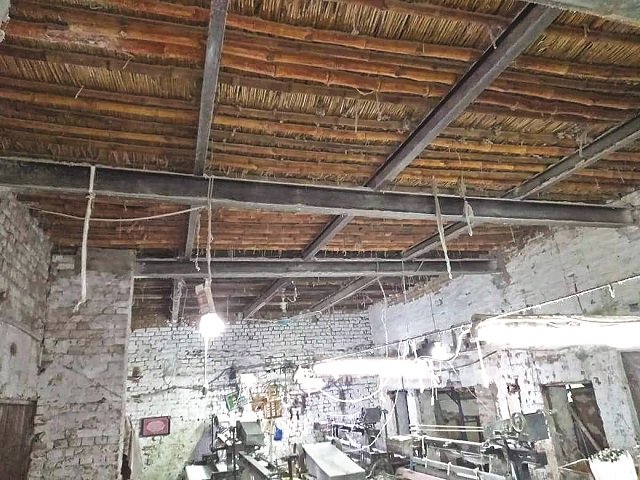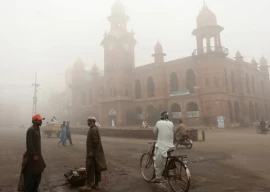
Cotton dust is a byproduct of the process that converts raw cotton into yarn or fabric. While short-term contact with the dust may irritate a person’s eyes, nose and throat, repeated exposure can damage the lungs and cause chronic respiratory diseases.
Despite repeated complaints from textile workers, the local health and safety department appears to be powerless in the face of influential business figures who are putting the health of poor labourers at risk.
Workers say that the department does not keep any checks and balances on the safety conditions of the workers and ignore rules pertaining to congenial working conditions in factories.
Dubbed the “Manchester of Pakistan,” Faisalabad enjoys the reputation of being the textile hub of the country. Various textile subsectors and production units are set up in the city, including spinning and weaving factories, printing, garments manufacturing, yarn manufacturing and packing facilities.
Given its massive size, the industry employs thousands of labourers to run and support it.
Over the years, lack of facilities has not only put textile workers’ health at stake, but many of them also reportedly met life-threatening accidents at work.
The most common problem that workers face on a day-to-basis, however, relates to the presence of cotton and dust particles in spinning, weaving and power loom factories.
There are about 150 big-and-small spinning mills in Faisalabad that produce yarn from cotton and around 75 weaving factories where fabrics are created from threads.
Textile industry likely to get higher import orders from US
In addition, there are around 300,000 fabric-manufacturing power loom units operating at different locations across the city.
Workers engaged in the aforementioned production processes are directly exposed to the dust that these facilities produce.
Avoiding ‘Monday Fever’
Since no measures are taken to alleviate the situation, labourers are left with no choice but to inhale the dust. What’s worse, workers only get to breathe in some fresh air on weekends, and as soon as they go back to work on Mondays, they are exposed to the dust again and symptoms of respiratory diseases – including chest pain and shortness of breath – resurface.
The phenomenon is commonly known as ‘Monday Fever,’ and textile workers consider it a matter of great concern, according to a recent study by researchers from Aga Khan University.
In order to avoid the so-called ‘Monday Fever,’ many workers even choose to work the entire week without taking their weekends off because they find it very difficult to accustom themselves to the polluted air on Mondays anew.
No other choice for workers
Many of the workers are sole breadwinners of their households and once inflicted with respiratory problems, they are unable to work long hours. To top it off, workers are employed on a daily-wage basis and fewer hours lead to deductions from their salaries, which they cannot afford.
“I have been working for the textile industry for the past 25 years and have had breathing problems throughout my career because of cotton dust,” informed Basher Ahmed, a worker.
“We have no other choice but to continue working under these conditions because we families to feed,” he lamented.
Further elaborating on the situation, Ahmed added that while breathing problems are common, some people even experience complete choking of their air passages. To cope with the situation, workers take short breaks, go out of the factories to get some fresh air, and then return to their designated work areas.
Nawaz Sunghera – another labourer who has been working in the textile sector for quite some time – said that workers have invented their own coping mechanism – they take hourly “breathing breaks”.
“Every hour, a few workers go out to get some fresh air while others take care of their work,” Sunghera said, adding that many workers end up quitting because cotton dust adversely affects their health.
Complaints fall on deaf ears
According to Latif Ansari – the leader of Textile Employees Union – workers often come to him with their grievances and complain that cotton threads not only remain suspended in the air, but they also get stuck in machines and the ceilings of the factory.
However, no measures are taken for the cleanliness of the facilities. As a result, some workers try to clean the machines themselves to make their work easier.
“It is the duty of factory owners to consider the health and safety of poor workers. The provision of safety masks, along with the installation of exhaust fans within the facility, must be ensured so that labourers can get some breathing space,” Ansari said. He also stressed the need for factories to hire cleaning staff.
Although workers come up with a myriad of complaints regarding the health-and-safety standards in textile factories, Waheed Khaliq Ramay – a representative of the Power loom Association – said that textile workers should be the ones to keep the factories and the machines tidy as separate cleaning staff cannot be employed.
Ramay further claimed that factory owners have already installed humidifiers and other required safety equipment in the facilities to reduce the amount of cotton dust in the air.
Shedding light on workers’ health conditions, Naveed Gulzar, the vice chairman of the Spinning Mills Association, said that textile factories have big units where labourers usually have access to all the required facilities.
“Labourers are provided with safety masks during work hours and proper ventilation system is in place, too,” Gulzar said.
He added that he has never received any complaints related to asthma or difficulty in breathing or weakening of the lungs from workers.
He further claimed that spinning and weaving factories are clean and they have various suction machines installed which pull cotton particles from the air.
On the other hand, Muhammad Rashid, secretary of the mills association, informed that out of the 150 small-and-large scale units, only 57 factories are registered with the association.
Other factories do not abide by the rules and regulations of the association, due to which they are not registered.
Speaking of the dangers associated with cotton dust, Dr Najam, chest specialist at Faisalabad’s Social Security Hospital, said that around 70 to 80 patients with complaints of chest pain, lung problems and asthma visit the hospital on a daily basis. He estimated that at least 30 to 40 of these were likely to be associated with the textile industry.
“Cotton dust can be injurious to the lungs and if a patient is suffering from asthma, their condition can be aggravated as they get older,” Dr Najam said. “Usage of safety masks, an airy workspace as well as the installation of humidifiers can improve the situation.”
Regarding the plight of textile workers, district environment officer Shaukat Hayat said that there are no standard operating procedures when it comes to controlling cotton particles, adding that his department has never received an official notification to look into the problem.
Hayat, however, added that his staff works hard to ensure a safe working environment in factories and inspectors regularly visit facilities to carry out health and safety checks.
Published in The Express Tribune, March 4th, 2019.



1732105641-0/BeFunky-collage-(78)1732105641-0-165x106.webp)

1726722687-0/Express-Tribune-Web-(9)1726722687-0-270x192.webp)


1732011525-0/Express-Tribune-(8)1732011525-0-270x192.webp)








COMMENTS
Comments are moderated and generally will be posted if they are on-topic and not abusive.
For more information, please see our Comments FAQ